Hidden Women’s Abodes
April 14, 2019
Source:The Sunday Times PUBLISHED APR 14 2019
Melody Zaccheus
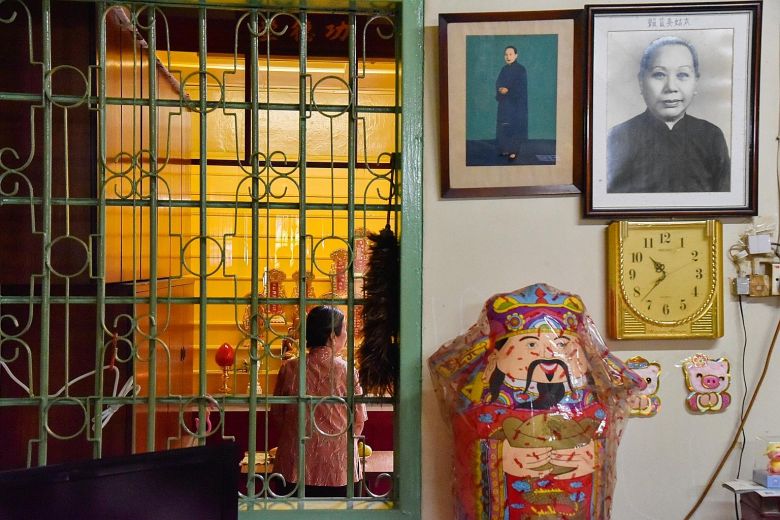
The prayer room at the back of the Guanyin Gong vegetarian hall in Cuff Road. The woman in the black and white portrait is the late Ms Wong Ying, the hall's founder. There are about 30 such halls in Singapore today and they have housed unmarried, widowed, destitute, abused and orphaned girls and women since the late 19th century. ST PHOTO: JASMINE CHOONG
Researcher studies little-known local history of vegetarian halls whose numbers are dwindling
It looks like a typical temple dedicated to Guanyin, but behind the altar of the goddess are living quarters for women.
The Little India shophouse unit at 19 Cuff Road has been home to a low-profile group of "vegetarian aunts" and their adopted daughters since it was established in 1954 by a Hakka woman.
It is not the only one. Operating away from the public eye are about 30 other so-called vegetarian halls in Singapore today. They have housed unmaried, widowed, destitute, abused and orphaned girls and women of a similar religious persuasion since the late 19 century.
In early Singapore, these female-led residences were critical in providing lodging and food to immigrant women living alone here, serving a niche neglected by most clans.
Some zhaigu, or vegetarian aunts or nuns, might have come from well-to-do backgrounds but were sent to vegetarian halls for reasons such as having incompatible Chinese horoscopes with members of their family. Then there are others who might have chosen to follow in the footsteps of Guanyin, who in one legend resisted marriage to pursue her religious beliefs. Among them were also the majie (Cantonese domestic servants) who retired there.
The women in these halls still practise a religion known as "The Great Way of Former Heaven". It incorporates religious practices from Confucianism, Taoism and Buddhism, and has its own esoteric practices.
The vegetarian nuns who live in the halls lead celibate lives and follow a vegetarian diet. The halls require that their occupants subscribe to the religion in order to live there. The halls were supported by their founders and donations of devotees.
Their religion requires them to keep a low profile, said Dr Show Ying Ruo from the National University of Singapore's (NUS) Asia Research Institute (ARI), who embarked on a five-year project in 2013 to study the vegetarian halls of Singapore, Malaysia and Indonesia. She presented her findings at an ARI workshop a month ago.
At one point, the Guanyin Gong shophouse in Cuff Road housed four vegetarian aunts and four adopted daughters. Now it is home to a vegetarian aunt and her two adopted sisters.
Dr Show's research project on vegetarian halls in South-east Asia is the first comprehensive effort of its kind since British anthropologist Marjorie Topley wrote about them in the 1950s and 1960s when she was based in Singapore.
Most of the vegetarian halls here are located in central Singapore. They were once thriving places - especially after the British introduced the Aliens Ordinance in 1933 which placed limits on the number of male immigrants allowed into Singapore, resulting in an influx of women.
A number of female boat traders, who were practitioners of "The Great Way of Former Heaven", arranged for fellow believers to come to Singapore, said Dr Show, 33.
She told The Sunday Times that the low profile maintained by the vegetarian halls could be traced back to the religion's roots in China. It was established during the Ming Dynasty (1368-1644) and expanded to parts of Asia in the late 19th and early 20th centuries.
Dr Show said: "It was a controversial and popular religion in China which was banned up till the early 20th century. It however thrived under the radar here because the colonial rulers did not get involved in religious matters."
The group's hidden goddess, the Eternal Mother, is typically enshrined in a secluded area, and only members of rank can worship her.
The vegetarian halls are all locally and regionally connected. The Waterloo Street Guanyin Temple, founded in 1884, functions as the hall's Singapore headquarters.
Dr Show approached almost 100 vegetarian halls in the region for her fieldwork, but not all interview requests were accepted. No other official research has been published here on this subject.
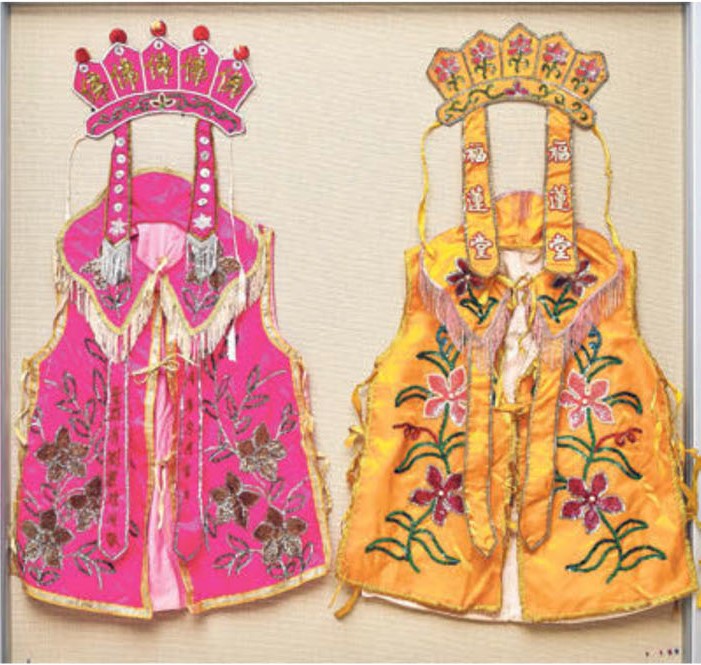
Ritual costumes donated by the defunct Vegetarian Hall of the Blessed Lotus to Dr Hue Guan Thye, who hopes to set up a museum in homage to vegetarian halls. ST PHOTO: KEVIN LIM
A Chapter is Closing
Lacking successors, a good number of vegetarian halls are now defunct and their owners have handed over their premises to Buddhist caretakers such as monks.
The Venerable Kwang Phing of the Singapore Buddhist Federation said that the declining birth rate in Singapore is one of the reasons the vegetarian halls receive fewer women for adoption, leading to their eventual closure. He said: "In some instances, the halls invite priests from their regional counterparts to perform rites, or they come to us for assistance. Our monks help in their religious affairs to ensure their remaining devotees can continue to visit the place."
Dr Show added that these halls are no longer the first option for women interested in nunhood, as the religion is more complex than Buddhism. Only a few high-ranking vegetarian nuns remain in Singapore and they are getting old.
Dr Show is chronicling the halls' transition into mainstream Buddhist sites. She noted that their syncretic teachings will be disposed and replaced by standardised Buddhism. After transitioning, the front-hall Guanyin is usually replaced by Buddha or other Mahayana Buddhist iconography.
Vegetarian nuns play different roles in the hall's religious system, much of which caters to devotees. Some read fortunes and handle prayer requests. Other conduct funeral rites or sew the robes of deities.
Anthropologist Vivienne Wee, 67, whose ancestor Wong Ying sponsored the establishment of the Cuff Road hall, said these places and the people who lived in them, played significant social roles. She added: "It is a form of indigenous feminism - where family unites were created through a system of religious adoption - that is especially endangered, and a cultural tradition that could soon be lost."
Together with a few other researchers, such as Dr Wee and Dr Hue Guan Thye from NUS' Chinese Studies Department, Dr Show hopes to one day establish a museum in homage to vegetarian halls.
Dr Show said: "Vegetarian halls will soon die out in a generation or so. It could become a forgotten story of our region where women helped other women and asserted unprecedented autonomous roles as religious leaders and temple managers."
Cuff Road shophouse home to vegetarian aunts since 1954
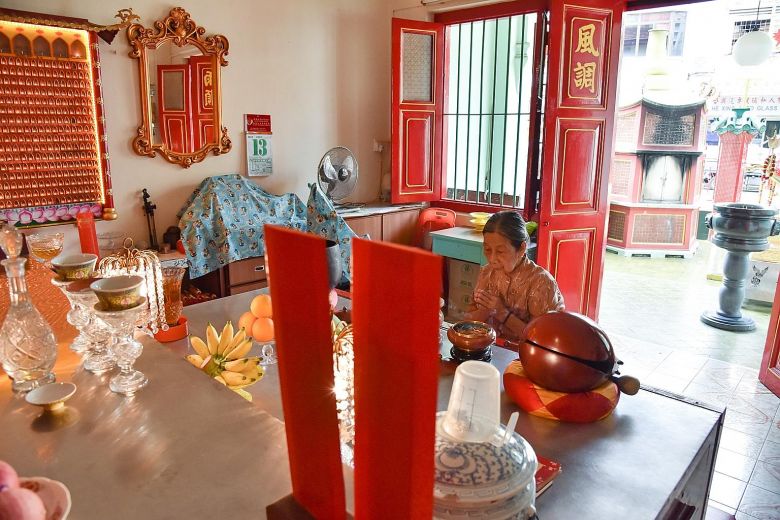
Vegetarian aunt Fengzhu Gu, 80, praying at a shrine near the entrance of Guanyin Gong Temple in Cuff Road. ST PHOTO: JASMINE CHOONG
Every eighth day of the lunar month, Fengzhu Gu (not her birth name), who wears her hair in a neat bun, prays from 6am till noon.
The 80-year-old flips through a book with neatly catalogued pink slips of prayer requests from devotees, and recites scriptural prayers on their behalf. Their prayer needs range from pleas for offspring, as well as blessings for safety and prosperity which families usually request at the start of each lunar year.
The vegetarian hall, located in a Cuff Road shophouse in Little India, specialises in divination.
Fengzhu Gu - "gu" means aunt - was named Fengzhu by her adoptive mother, the late Ms Wong Ying, the hall's founder.
The women practice a religion known as "The Great Way of Former Heaven". It incorporates religious practices inherited from Confucianism, Taoism and Buddhism, and has its own esoteric practices.
The Cuff Road hall's vegetarian nuns refer to themselves as vegetarian aunts. They have taken vows of celibacy. Their halls serve as female-only residences.
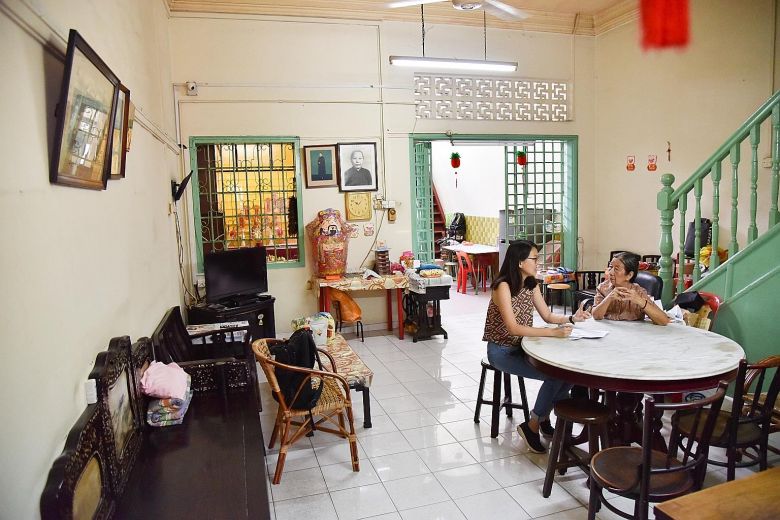
Dr Show Ying Ruo speaks with Fengzhu Gu, 80, at the living space in Guanyin Gong vegetarian hall at Cuff Road. ST PHOTO: JASMINE CHOONG
Born in Singapore in 1939, Fengzhu Gu was exposed to the religious life at the age of 10, when her father died. Her mother, who had to work, sent her to a vegetarian hall in Joo Chiat for a week to see if she could get used to life there. She adapted well and went on to become a vegetarian aunt. She moved with Ms Wong to the Cuff Road vegetarian hall when she was 15.
Today, she lives together with two other adopted sisters in a quaint shophouse filled furnishings from the 1950s, such as wooden cabinets that pop out against the mint green interior accents. Her current housemates include one who retired in her 60s and returned to the hall after a health setback while working in Hong Kong. The other is in her 30s and works in a hotel.
The hall, which opened in 1954, encouraged its adopted daughters to choose their own paths - be it becoming a vegetarian aunt, pursuing their studies, working, or getting married.
At one time, the hall had four vegetarian aunts and four adopted daughters. Speaking in Mandarin, Fengzhu Gu who declined to give her full name, said: "It was not unusual for poor couples, with many children to send one or two of their offspring to live in vegetarian halls."
In the past, the hall would also host visiting vegetarian nuns from the region.
On the hall's key festival days, residents used to wake up at about 2am to start preparing vegetarian fare, such as mock meat and popiah. The food techniques were passed down from the older vegetarian aunts, said Fengzhu Gu. Now, most of the food is purchased.
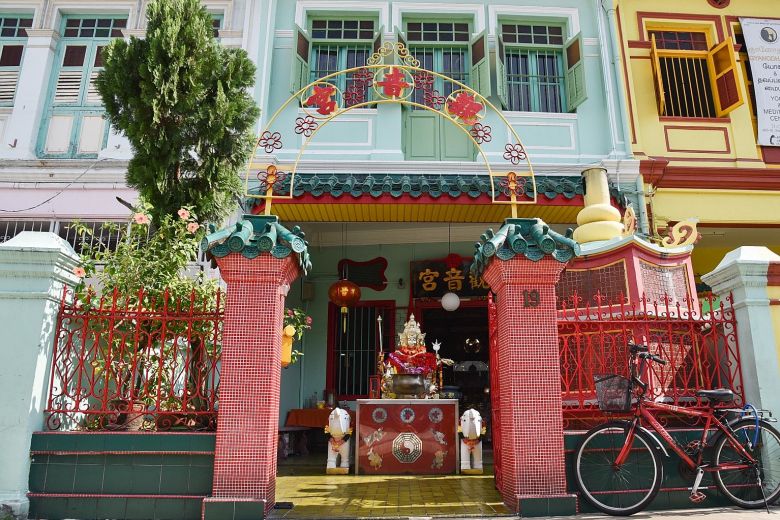
Guanyin Gong vegetarian hall in Cuff Road. Dr Show Ying Ruo, who studied these halls, says the shophouse that is home to the hall was bought for $30,000. ST PHOTO: JASMINE CHOONG
Dr Show Ying Ruo of National University of Singapore's Asia Research Institute said that the shophouse was purchased for $30,000, with $10,000 from Ms Wong's savings and $20,000 borrowed from an insurance company.
Fengzhu Gu said very few people know of the vegetarian hall as it is located on a short street. She added: "No one is really curious about what's happening behind our front hall altar. They simply think it's a temple and they just go on with their day."

